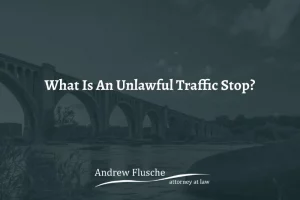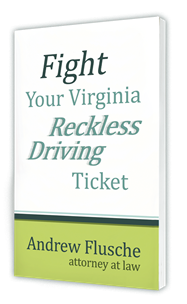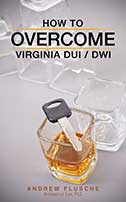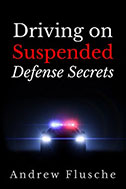What Is An Unlawful Traffic Stop?

In Spotsylvania, Fredericksburg, and the surrounding areas, I’ve worked with many people like you to overcome the harm caused by an illegal traffic stop.
Call Andrew Flusche, Attorney at Law, PLC, to discuss your rights and what I can do to help protect them.
Can Police Stop You for No Reason?
No, the police cannot stop you for no reason. The police must meet the legal standard called “reasonable suspicion” to stop you.
Reasonable suspicion means the police have an objective belief that you are committing, have just committed, or will imminently commit a crime.
However, this is a very low standard—even lower than probable cause—and many believe that the bar of reasonable suspicion is so low that it gives officers a great deal of leeway when stopping people.
As a means of comparison, let’s discuss other standards of proof we use in Virginia to illustrate just how little evidence the police need to stop you legally.
Comparison: Probable Cause and Beyond a Reasonable Doubt
The police need probable cause to arrest you. Probable cause essentially means that circumstances would cause a reasonable person to believe that a crime had been committed, was being committed, or was going to be committed.
This is the level of suspicion an officer must have to arrest you or get a search or arrest warrant.
When a citizen’s freedom is at stake, the law sets a very high bar. To convict you of a crime, the prosecutor has to prove you guilty beyond a reasonable doubt.
This is the highest standard used in the legal justice system. It means that the Commonwealth needs to convince a jury that no other reasonable explanation can exist based on the facts of the case.
The prosecutor must prove every element of a crime to this high standard before they can incarcerate a citizen.
As you can tell, the standard to stop you is much lower than the standard to arrest or convict you. That’s because a stop is not supposed to be a long encounter (unless evidence of a crime is uncovered).
A stop, by its nature, should last as long as the police reasonably need to satisfy their suspicion.
If the police stop you with no reasonable suspicion of any crime, or if a stop turns into an arrest despite the absence of probable cause, then the police have likely violated your rights.
What Is an Illegal Stop by Police?
Let’s look at some examples of valid and illegal stops to help answer the question, What is an unlawful traffic stop?
Valid Stop: Traffic Violation
One of the most common reasons police cite for pulling someone over is a traffic violation.
The police can pull you over for a traffic violation if they observe one. Speeding, running a red light, texting, and erratic driving are examples of valid reasons for pulling someone over.
Once they stop you, the officer can ask for your license and proof of insurance and then run a warrant check and a check to see if you are driving a registered and insured car.
They can get that information from their computer or dispatch and issue you a traffic citation if appropriate. Of course, if there is an active warrant for your arrest, they can arrest you. If the checks come back clean, the stop shouldn’t last too long.
DWI stops are another common reason to pull someone over. Law enforcement officers can pull you over if you are weaving or slowing down for no reason.
They can ask you for your license and insurance. As you retrieve these items, the officer will observe you to see if anything indicates intoxication.
Red eyes, slurred speech, and impaired movements or cognitive functioning can be indicators that allow them to continue investigating without violating your rights. If there are no such indicators, the officer should let you go.
Illegal Traffic Stop: Near the Scene of a Crime
The police could stop you even if you did not commit a traffic violation. For example, suppose someone robbed a bank on Main Street, and the 911 caller said the robber fled in a red sports car.
If you are in the vicinity in a red sports car, the police might have a valid reason to pull you over. Conversely, if you are in a blue pickup and the police stop you, then they likely have violated your rights.
Profiling
Stopping you because of your race is illegal. If you are pulled over due to your race and without reasonable suspicion of committing a crime, it is illegal.
Baiting or Pretext
Sometimes law enforcement agents bait a person into committing a traffic offense to justify stopping their car.
Unlawful Traffic Stop Lawsuit
The law provides two remedies when police violate your rights. Typically, your lawyer will file a motion to suppress evidence obtained from an illegal traffic stop.
Suppose you face a DWI charge. As we discussed, the police need to observe some problems with your driving to justify stopping you. What if they didn’t?
What would happen if they stopped you after leaving a bar, but you never drove erratically or violated any traffic laws?
You’ve had two drinks in two hours after a long day at work. You refuse the breathalyzer, and now the police arrest you. What can you do?
The appropriate remedy is suppressing the evidence from the illegal traffic stop.
If the motion to suppress is successful, the judge will throw out the police officer’s observations, field sobriety tests, and your breathalyzer refusal. At that point, the prosecutor likely has no evidence and will typically dismiss the case.
A civil lawsuit is the second remedy. Federal law allows you to file a civil suit against the police if they violate your civil rights.
Under 42 USC 1983, you can sue the police for monetary damages if an officer violated your civil rights while acting under the color of law.
What To Do When You Get Pulled Over
Here are a couple of things to keep in mind when you get pulled over.
- You don’t have to speak or answer questions;
- You should always keep your hands visible;
- You do not have to volunteer information, and you should not;
- You should not consent to a search of your car; and
- Ask for a lawyer right away if the police begin questioning you.
You can assert your rights, but it is crucial to remain polite and compliant. Do not be rude or combative, and do not resist arrest, as this will only get you charged with another crime.
And once you ask for your lawyer, politely remain silent until your lawyer arrives.
What Are Your Rights When Stopped by Police in Virginia?
As we’ve discussed, you have numerous rights when stopped by police. To know which rights police might have violated, you need to speak to a knowledgeable lawyer who can thoroughly analyze your case.
Contact my office today or call me at 540-318-5824 to find out more. I offer free consultations, and someone is available 24/7 to take your call.




